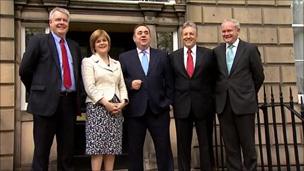'That is the locomotive behind change in these islands'
- Published
- comments

In the sidings? Carwyn Jones with other devolved leaders
Could tax powers for Wales be closer than we think? Thought that would get you reading.
This week's meeting in Edinburgh between the heads of the Scottish, Northern Irish and Welsh leaders was dominated by preparations for a vitally important post-election meeting with the UK Government next week. My counterpart in Scotland, Brian Taylor, has given his analysis here.
Scottish leader Alex Salmond opened the press conference by noting that next week will see "key financial discussions" on issues such as the flexibility of the devolved administrations in running their own finances.
He said, "All three administrations expect to see, in light of the respect agenda, key issues of progress being made next week."
The aim of the meeting was for the three governments to discuss those issues before making their journey to Whitehall - and although all concerned were at pains to present a united front, promising to support each other's positions, what came across was the widely varying agendas that each will take into next week's talks.
Speaking to BBC Scotland after the meeting, Mr Salmond was not keen to dwell on the possibility that HM Treasury might seek to stall his and Northern Ireland's demands on areas like the devolution of corporation tax and other financial freedoms.
"What's making things happen is the views of the people of Northern Ireland and Scotland. That is the locomotive behind change in these islands," he said.
Note the omission, a colleague says darkly.
Mr Jones was noticeably more circumspect than the leaders of the other administrations - unsurprisingly for a leader who's just stood in an election promising not to devolve income tax, for example.
"What has been done today is to agree a broad thrust for discussions with the UK Government. Each administration, of course, will have differing views on which powers each administration would want to pursue for their respective nations, but nevertheless it's important that we build on the respect agenda that was outlined by the Prime Minister before the devolved elections."
Mr Jones may well have "differing views" on greater fiscal autonomy compared to Scotland and Northern Ireland, preferring to concentrate on "fairer funding" through reform of Barnett and borrowing powers for Wales.
But he'll be alone around the table next week in arguing that those reforms should take place without any kind of fiscal accountability for his government in terms of raising its own finance through taxation.
This is unlikely to go unnoticed by the Treasury. Two leaders will be asking for more responsibility for their own financial affairs, and the other will simply be arguing for more cash to spend from the central pot - albeit cash he says should fairly come to Wales.
Remember that while Mr Jones is arguing for Barnett reform, what's on offer from the UK Government is a "Calman-style Commission" along the lines of what took place in Scotland. But also remember the emphasis of the Scottish Calman was very much examining fiscal accountability and autonomy rather than any change whatsoever to the devolved funding system.
What do the Welsh Government know about the proposed Commission, beyond the single line in the Conservative-Liberal Democrat coalition agreement, 12 months after it was unveiled? Nothing at all, says a senior source. Zero.
One easy means of stifling Barnett reform for the Treasury would be to link it to a package of fiscal reforms, including, potentially, a degree of tax-varying powers for Wales. The First Minister has repeatedly said that this would require a referendum - and one which few would regard as winnable.
A possible - but highly controversial - way through this which has been suggested to me is that the UK Government could deliver a package of reforms relating to each of the four nations of the UK, financial and constitutional, incorporating greater fiscal autonomy, reform of the Lords and so on, which together could be billed as a "settlement to stabilise", keeping the Union together.
It could then be argued that tax-varying powers for Wales along the Scottish model would be introduced without a referendum of the Welsh people - as part of this UK-wide settlement.
One senior Plaid figure observed to me recently that one consequence of deciding to govern alone will be that Carwyn Jones can no longer take constitutional and financial matters to his backbenchers and say "I know, I know, but it's what Plaid want". He's now got to stand up and say, 'This is what I want'".
Whether he will have the luxury of telling the UK Government what he wants next week remains to be seen. The locomotive of change already seems to be leaving the station, destination unclear.